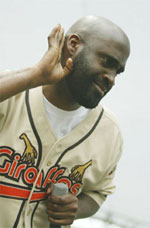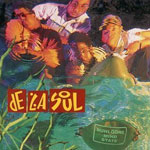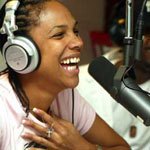
And that’s been part of the problem for Posdnous and the boys. The first De La set had such an impact, and retains a lasting impression, that the group’s never really shaken it off. Given the slightest encouragement, we’re all back in the Daisy (Da Inner Sound Y’All) Age, in our brightly coloured gear and beads, with Prince Paul creating those magnificent sound collages, while the guys up the front take it in turns to deliver their tongue-twisting positive poetry that sets the mind a whirling, and yeah we can’t help breaking into these great big grins like the Lovin’ Spoonful singing 'Do You Believe In Magic?'
After Three Feet High And Rising De La Soul released a whole series of much more serious and stripped-down records, that were far darker in content, and ultimately far more satisfying than that debut which nevertheless does still remain an important defiant gesture in the development of hip hop, and a key part of one of pop’s golden ages. The early De La Soul sound was part of a deliberate reaction to a prevailing mood within the hip hop community. Here suddenly was music that was not explicitly about coming from the ghetto, it was not theatrically thuggish and crassly crude, and it dared to show its intelligence on its colourful sleeve. And there was fun to be had in all that thoughtfulness.
It’s possible to see the similarities with Postcard Records and Orange Juice in particular. The early OJs very purposefully reacted against the macho rock stereotype, with Edwyn Collins skipping around the stage like a defiant dandy, camping it up gloriously to provoke. Later groups that unsuccessfully appropriated the look and sound of the early OJs had nothing to revolt against, and lacked the guts to goad, and the wit to woo to boot. And Edwyn Collins and Orange Juice spent their next few albums trying to shake off some absurd stereotyped image, though conversely this as with De La Soul was the spur to create some considerably more spartan and significant sounds. What price 'The Bridge' as Orange Juice’s Buhloone Mindstate?

Both De La and A Tribe Called Quest were closely associated with the Native Tongues, an umbrella hip hop collective or community that evolved from Afrika Bambaata’s Zulu Nation, with an emphasis on accentuating the positivity of Afrocentricity and diversity. So the acts involved in this loose conglomerate were brave enough to throw everything into the melting pot and create some wonderfully unique beats and rhymes.
And at the forefront of the Native Tongues were the Jungle Brothers, who perhaps ironically are best known for being bold enough to throw their lot however temporary in with Todd Terry to create a great slice of what’s occasionally known as hip house. I say it’s bold because the hip hop fraternity tended to be dismissive of house as worthless disco, but nevertheless there are now people so many years on who are amazingly fond of those rare occasions where hip hop and house music did fuse. And on this side of the Atlantic there were hits for the likes of the Beatmasters, who utilised some of the best UK female MCs, like the Cookie Crew and one Alison Clarkson, between being a She Rocker (and getting to support Public Enemy) and becoming the great Betty Boo, and Coldcut with the Wee Papa Girl Rappers, and yes those pop songs retain an enduring charm and infectious energy.
The Cookie Crew and She Rockers are among those given namechecks in the credits for the Jungle Brothers’ The Forces of Nature set, possibly the definitive document of the Native Tongues’ time. Another London MC also featured on The Forces of Nature is Monie Love, who in her own words missed the ‘plane back to the UK and made New York her home, where she became a key part of the Native Tongues posse, participating in the anthemic 'Doin’ Our Own Dang', where the JBs’ Afrika Baby Bambaata raps: “Well my family sets all the trends from Soul II Soul onto Loose Ends. A&R men sign groups like them ‘cause that’s where the money is at honey. The industry’s filled wit’ copy-cats, r’n’b mixed wit’ sloppy raps. Tribes like us always open doors but what for so you can git yours. You ain’t into it, all you want is profit, so I ask you please to stop it”.

Monie has since resurfaced as a presenter on a Philly rap show, the city where she also hosts a live showcase called Ladies Love Hip Hop, arguing: “Hip hop is a culture that for one reason or another people choose not to recognise, and promote as disposable. There needs to be those in radio, on TV, in the media publications and within retail that stick to their guns in a passive aggressive manner in order to uphold all that is sacred to a bea(u)tiful, meaningful, not to mention funky as all heck culture, and remind those who forgot, and teach those that don’t know”.
Monie may have been luckier or tougher than most femme rappers. Her fellow London MCs, the Cookie Crew, also got to record with the Native Tongues’ Black Sheep and indeed Gang Starr. And while their records, like the Fade To Black set, still sound (and look) fantastic, there is no doubt that the pressures of record company politics tore them apart, as they resisted the rush to commercialise and sterilise.
With the hip hop world tearing itself apart with bragging, boasting, and battling, and businessmen making fortunes out of the turmoils, the popularisation of the positivity vibe was to become just another part of the marketing strategies. So amidst what was really a golden age, for every brilliant and groundbreaking record by, say, Souls of Mischief, Poor Righteous Teachers, and Brand Nubian, there were hits for Dream Warriors, Digable Planets, Arrested Development. And the Native Tongues’ moment was gone.
As De La and A Tribe Called Quest continued doing their thing, so occasionally the Native Tongues’ philosophy would come back into focus, particularly when during another golden age there were records from Black Star, Common, and the Roots to once again highlight the possibilties for hip hop to produce something more substantial than fast food.
And every once in a while one would read how the spirit of the Native Tongues would haunt the music of so-and-so, whether it be Slum Village, The Coup, Jean Grae, or Edan, and usually it’s a good thing, but you can bet it’s not going to sell like some of that stuff that’s big with the kids in the malls.
© 2006 John Carney